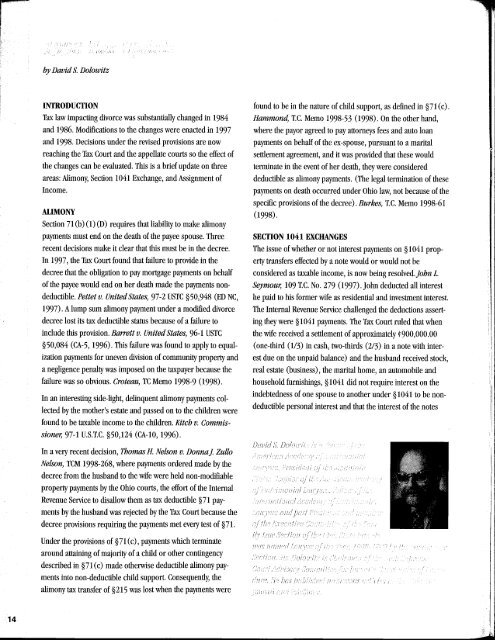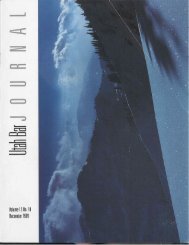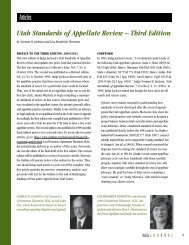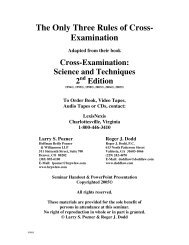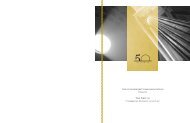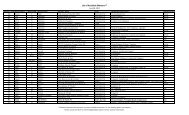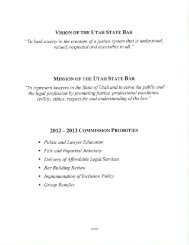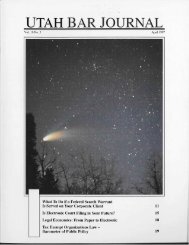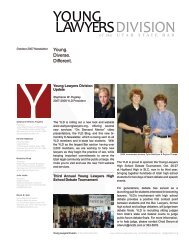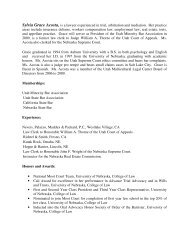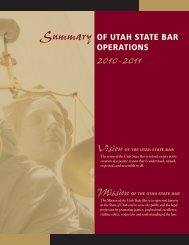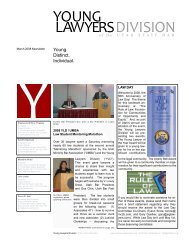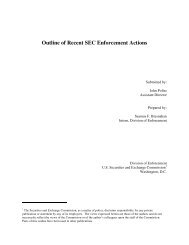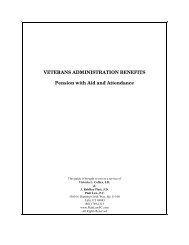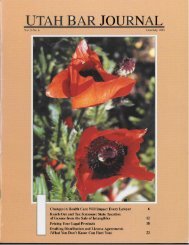March 1999 Volune 12 No3 - Utah State Bar
March 1999 Volune 12 No3 - Utah State Bar
March 1999 Volune 12 No3 - Utah State Bar
Create successful ePaper yourself
Turn your PDF publications into a flip-book with our unique Google optimized e-Paper software.
I"<br />
I.<br />
14<br />
by David S. Dolowitz<br />
INTODUCTION<br />
Tax law impacting divorce was substantialy changed in 1984<br />
and 1986. Modifcations to the changes were enacted in 1997<br />
and 1998. Decisions under the revised provisions are now<br />
reachig the Tax Court and the appellate courts so the effect of<br />
the changes can be evaluated. This is a brief update on three<br />
areas: Alony, Section 1041 Exchange, and Assignment of<br />
Income.<br />
ALIMONY<br />
Section 71 (b) (1) (D) requires that liabilty to make almony<br />
payments must end on the death of the payee spouse. Three<br />
recent decisions make it clear that this must be in the decree.<br />
In 1997, the Tax Court found that faiure to provide in the<br />
decree that the obligation to pay mortgage payments on behal<br />
of the payee would end on her death made the payments non-<br />
deductible. Pettet v. United <strong>State</strong>s, 97-2 USTC §50,948 (ED NC,<br />
1997). A lump sum almony payment under a modied divorce<br />
decree lost its ta deductible status because of a faiure to<br />
include this provision. <strong>Bar</strong>rett v. United <strong>State</strong>s, 96-1 USTC<br />
§50,084 (CA-5, 1996). This faiure was found to apply to equal-<br />
ization payments for uneven division of community property and<br />
a negligence penalty was imposed on the tapayer because the<br />
faiure was so obvious. Croteau, TC Memo 1998-9 (1998).<br />
In an interesting side-light, delinquent alony payments col-<br />
lected by the mother's estate and passed on to the chidren were<br />
found to be taable income to the chidren. Kitch v. Commis-<br />
sioner, 97-1 U.S.T.C. §50,<strong>12</strong>4 (CA-lO, 1996).<br />
In a very recent decision, Thomas R Nelson v. DonnaJ Zullo<br />
Nelson, TCM 1998-268, where payments ordered made by the<br />
decree from the husband to the wie were held non-modifable<br />
propert payments by the Ohio courts,' the effort of the Internal<br />
Revenue Servce to disalow them as tax deductible § 71 pay-<br />
ments by the husband was rejected by the Tax Court because the<br />
decree provisions requiring the payments met every test of § 71.<br />
Under the provisions of § 71 (c), payments which terminate<br />
around attag of majority of a chid or other contingency<br />
described in § 71 ( c) made otherwse deductible alony pay-<br />
ments into non-deductible chid support. Consequently, the<br />
alony tax transfer of § 215 was lost when the payments were<br />
found to be in the nature of chid support, as defined in § 71 (c) .<br />
Hammond, T.C. Memo 1998-53 (1998). On the other hand,<br />
where the payor agreed to pay attorneys fees and auto loan<br />
payments on behal of the ex-spouse, pursuant to a marital<br />
settlement agreement, and it was prOYided that these would<br />
terminate in the event of her death, they were considered<br />
deductible as almony payments. (The legal termiation of these<br />
payments on death occurred under Ohio law, not because of the<br />
specifc provisions of the decree). Burkes, T.C. Memo 1998-61<br />
(1998).<br />
SECTION 1041 EXCHAGES<br />
The issue of whether or not interest payments on §1041 prop-<br />
ert transfers effected by a note would or would not be<br />
considered as taxable income, is now being resolved.john L.<br />
Seymour, 109 T.C. No. 279 (1997). John deducted al interest<br />
he paid to his former wife as residential and investment interest.<br />
The Internal Revenue Servce chalenged the deductions assert-<br />
ing they were §1041 payments. The Tax Court ruled that when<br />
the wife received a settement of approximately 4900,000.00<br />
(one-third (1/3) in cash, two-thirds (213) in a note with inter-<br />
est due on the unpaid balance) and the husband received stock,<br />
real estate (business), the marita home, an automobile and<br />
household furnishigs, §1041 did not require interest on the<br />
indebtedness of one spouse to another under § 1041 to be non-<br />
deductible personal interest and that the interest of the notes<br />
L1aDid ST,


